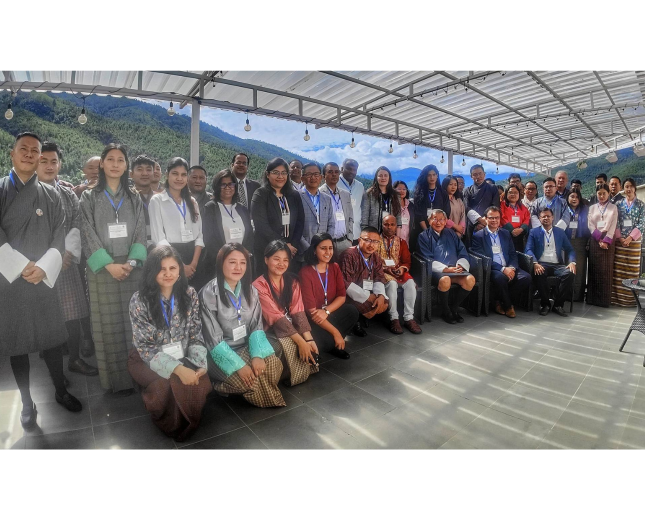From 5 August to 8 August 2024, RCC MENA and South Asia held a 4-day regional workshop in Thimphu, Bhutan, to deepen South Asian countries' understanding of Article 6 of the Paris Agreement and Carbon Pricing and accelerate their mitigation actions, including ambitious nationally determined contributions (NDCs).
Agenda
Day 1: Understanding Carbon Markets and interlinkages with NDCs
Day 1 presentation
| 8:30 - 9:00 |
Registration |
| 9:00 - 9:30 |
Welcome and Introduction |
| 9:30 - 9:50 |
Tea break and group photo |
| 9:50-10:45 |
Taking stock of the Carbon Markets - Main Instruments and Trends |
| 10:45-11:00 |
Break |
| 11:00-12:45 |
Leveraging Carbon Market Instruments for NDC achievement and progression |
| 12:45-14:00 |
Lunch |
| 14:00-15:45 |
Implementing Carbon Pricing for Climate Action |
| 15:45-16:00 |
Break |
| 16:00-17:00 |
Article 6 - Cooperative Approaches |
Day 2: Operationalizing Article 6 in South Asian Countries
Day 2 presentation
| 9:00 - 9:10 |
Recapping Day 1 |
| 9:30 - 10:30 |
Unlocking Article 6 Potential and Catalyzing Climate Action for NDCs
|
| 10:30 - 10:45 |
Break |
| 10:45-12:45 |
Operationalizing Article 6 in South Asian Countries |
| 12:45-14:00 |
Lunch |
| 14:00-15:15 |
Article 6.2 - Reporting, Reviewing and Tracking |
| 15:15-15:30 |
Break |
| 15:30-16:45 |
Article 6 - Simulated Exercise on Reporting, Reviewing and Tracking |
| 16:45-17:00 |
Reflections and Closing |
Day 3: Operationalizing Article 6 in South Asian Countries
Day 3 presentation
| 9:00 - 9:10 |
Recapping Day 2 |
| 9:10 - 10:45 |
Leveraging the Article 6: Institutional Engagement and Basic Requirements
|
| 10:45-11:00 |
Break |
| 11:00-11:45 |
Exploring Article 6.4 - Framework and Opportunities |
| 12:00-12:45 |
Roles, Responsibilities and Participation Requirements |
| 12:45-14:00 |
Lunch |
| 14:00-16:00 |
Digital Solutions to operationalize Article 6: Market infrastructure
|
| 16:00-16:15 |
Break |
| 16:45-17:00 |
Reflections and Closing |
Day 4:Operationalization & Action Planning, Article 6 in South Asian Countries
Day 4 presentation
| 9:00 - 9:10 |
Recapping Day 3 |
| 9:10 - 10:45 |
Overview of Article 6 Capacity Building Initiatives in South Asia Region
|
| 10:45-11:00 |
Break |
| 11:00-12:00 |
Strengthening the knowledge: insights from Theory to Practice |
| 12:00-12:45 |
Private sector roles in A6 for NDC Implementation
|
| 12:45-14:00 |
Lunch |
| 14:00-15:00 |
Article 6.8 Background and Experiences
|
| 15:00-15:15 |
Break |
| 15:15-16:30 |
Embedding Workshop Learnings into National Strategies |
| 16:30-17:00 |
Closing of the Workshop |
Summary
Hosted by the Ministry of Energy and Natural Resources, the workshop drew over 65 participants from six counties: Bangladesh, Bhutan, Maldives, Nepal, Pakistan, and Sri Lanka. Representatives of various regional partners and organizations also attended.
The training focused on two key areas:
- Operationalization of cooperative approaches under Article 6 of the Paris Agreement
- The role of carbon pricing in enhancing climate action, particularly in supporting ambitious NDCs
The workshop also saw the participation of key regional partners including the Asian Development Bank and the World Bank. Their substantive insights shared during the workshop sessions, as well as an overview of their activities in the region in Article 6 and Carbon Pricing related areas added great value to the programme.
Participants received a comprehensive introduction to several key aspects of Article 6, including:
- Article 6.2: Covering the basics of the cooperative approach, concept of corresponding adjustments and relevant reporting, review requirements.
- Article 6.4: Addressing the mechanism cycle, time frames, principles of Article 6.4 emission reductions and mitigation outcomes. This section also covered the transition from the Clean Development Mechanism (CDM).
- Article 6.8: Detailing non-market approaches (NMA) under the cooperative approaches.
This training served as a valuable platform for knowledge exchange and collaboration among South Asian countries, reinforcing their commitment to effective climate action. It also revealed that collaboration and knowledge sharing are vital for overcoming challenges and maximizing opportunities within the carbon market.
